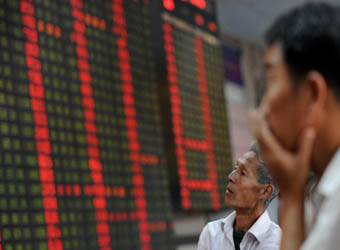Asian stock markets ended Friday mostly lower after North Korea threatened it could consider testing a nuclear weapon in the Pacific.
Investors also digested the prospect of an additional rate hike from the Fed this year.
The greenback fell against the safe-haven Japanese currency after South Korea’s Yonhap news agency reported a North Korean official said his country could consider testing a hydrogen bomb in the Pacific.
The yen jumped in a knee-jerk reaction, trading at 111.96 to the dollar at 3:38 p.m. HK/SIN from levels around 112.4 before the news.
Gold, another safe haven asset investors turn to during period of geopolitical uncertainty, edged up from a four-week low on the news. The yellow metal traded at $1,296.96 an ounce at 12:23 p.m. HK/SIN, but remained below the $1,300 handle seen after the North’s most recent missile launch on Sept. 15 local time.
Meanwhile, the Korean won fell to its lowest levels in a month in reaction to the headlines, trading as low as 1,139.50 to the dollar, compared with levels around 1,131 won in the last session. The won traded at 1,133.71 to the dollar at 3:42 p.m. HK/SIN.
Geopolitical concerns over the Korean Peninsula have remained under the spotlight as the Trump administration has attempted to put more pressure on North Korea. President Donald Trump signed on Thursday a new measure that expanded the Treasury Department’s authority to target people and institutions conducting business with the North.
In turn, North Korean leader Kim Jong Un said Friday that Trump would “pay dearly” for his speech at the United Nations earlier this week.
On the back of the threat-swapping between North Korea and the U.S., investors would likely remain antsy heading into the weekend, said Emmanuel Ng, a strategist at OCBC, in a note.
Japan’s Nikkei 225 erased early gains to close down 0.25 percent, or 51.03 points, at 20,296.45.
Across the Korean Strait, the Kospi fell 0.74 percent to close at 2,388.71, while the tech-heavy Kosdaq index tumbled 1.84 percent by the end of the session. Several blue chip tech names held onto early gains, but traded off session highs following North Korea headlines. Samsung Electronics closed up 0.38 percent and SK Hynix was flat, while Posco fell 3.16 percent.
Greater China markets were lower after S&P downgraded China’s sovereign credit rating to A+ from AA-, citing the mainland’s credit growth as a risk. The downgrade from S&P put its rating in line with Moody’s and Fitch.
The Hang Seng Index fell 0.81 percent to close at 27,882.84. Mainland markets saw more moderate losses. The Shanghai Composite slipped 0.15 percent to close at 3,352.8717 and the Shenzhen Composite shed 0.342 percent to close at 1,988.5891.
The S&P/ASX 200 shrugged off the news to gain 0.47 percent, closing at 5,682.137, with the heavily-weighted financials sub-index climbing 0.92 percent by the end of the trading day.
Markets also focused on the U.S. Federal Reserve, with market expectations for a December rate hike have increasing since the central bank indicated one more interest rate hikewas likely by year-end on Wednesday. The probability for at least one additional rate hike by the end of the year stood at 78.4 percent, according to the CME Group’s FedWatch tool on Friday.
The Fed on Wednesday had also announced its intentions to start reducing its $4.5 trillion balance sheet.
The dollar pared gains after initially climbing on the Fed’s announcement on Wednesday. The dollar index, which tracks the dollar against a basket of currencies, stood at 91.870, off the 92.5 handle seen at the end of Asian trade in the previous session.
Meanwhile, the yield of the benchmark 10-year U.S. Treasury note edged down to 2.26 percent from 2.278 percent on Thursday.
Stateside, major indexes finished the session lower, with the Dow Jones industrial average slipping after closing higher for nine days in a row. The Dow shed 0.24 percent, or 53.36 points, to close at 22,359.23.
Also in central bank-related news, the Bank of Japan announced Thursday that it would keep its monetary policy steady.
In corporate news, HTC stock climbed 9.96 percent by the end of the session after resuming trade a day after Google announced a $1.1 billion agreement with the Taiwanese company. HTC shares had been suspended from trade on Thursday, prior to the announcement.
Chinese banks were also on the radar after the People’s Bank of China reportedly informed them to adhere to United Nations sanctions against North Korea, Reuters said, citing sources.
Mainland-listed bank stocks finished the session higher: ICBC rose 0.68 percent, Agricultural Bank of China gained 0.8 percent and Bank of China tacked on 0.72 percent, but the banks’ Hong Kong-listed shares traded lower.
On the energy front, Brent crude edged up 0.18 percent to trade at $56.53 a barrel, while U.S. crude tacked on 0.22 percent to trade at $50.66.
In currency moves, the Australian dollar recovered slightly after falling overnight on comments from the Reserve Bank of Australia. RBA Governor Philip Lowe said Thursday the central bank did not necessarily have to raise interest rates just because global central banks were doing so, Reuters said. The Australian currency edged up to $0.7949 at 3:46 p.m. HK/SIN.
The agenda for Friday was data-light, with the only notable event being the Indonesian central bank’s rate decision at 5:00 p.m. HK/SIN.
Ahead, markets will keep an eye on election-related headlines as New Zealand and Germany head to the polls over the weekend.
Source: CNBC


